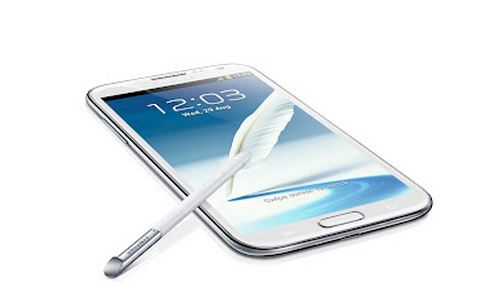
I had to get a new phone because my pants were too tight.
Either I'm too fat, or I was wearing jeans that were that special degree of skinny obnoxiousness, but I put my Galaxy Nexus in my hip pocket one night and the screen cracked in half. I know this because it made an audible cracking noise as I strode down the street.
Then, a couple of days later, it happened again. The first crack must have compromised the structural integrity of the fortified-but-not-Gorilla-Glass screen. Somehow, a side effect of the second massive crack was that the screen stopped being able to go to sleep. It was always on. Even when I set the screen to power down after ten seconds, it would pop right back on as soon as it blinked off.
There is nothing like a broken screen to make you start looking for a new smartphone.
Unimpressed with the current Verizon Wireless smartphone selection, I opted to replace my broken Samsung Galaxy Nexus with the Samsung Galaxy Note 2 based on the sketchy rationale that a 4.6" phone screen breaks in my pants pocket, so a phone that I can't even fit in my pocket is safe from the same fate.
After the initial shock of moving from Google's Android into Samsung's TouchWiz, I found that this was a surprisingly responsive, fast, and powerful piece of hardware, and it is outstanding for several reasons.
The Battery Life is Great
With a standard 3100 mAh battery, the Galaxy Note 2 can hang around on standby much longer than other smartphones. My first week with the device was pretty light on communications and travel, and I only had to charge it every other day. Like every other mobile phone, it is susceptible to battery drain in low signal areas. In the second sub-basement of an underground parking structure in Washington DC, the Note heated up and sucked down a quarter of its battery hanging onto a 1x CDMA signal. Once I was in the clear outdoors and in freestanding outdoor structures, the battery consumption leveled out and lasted the rest of the day through casual browsing and texting.
The S Pen is magical
I am anything but impartial in this respect. I used to love the Koalapad back in my childhood C64 days, and I have been a Wacom pen tablet user for almost a decade. That being said, I hated the resistive stylus mobile interface on Palm and Windows Mobile, and capacitive stylus interfaces thus far have failed to impress me. But the S Pen is different.
Maybe it's the responsiveness, maybe it's the way the handwriting is reproduced in Android, maybe it's the hard-to-stump handwriting recognition engine, maybe it's the intuitive erase feature; whatever it is, the S Pen is easy to use and easy to love. The S Pen application menu interface is heinously ugly, but the notes, drawings, and figures you can create are brilliant, and they're reasonably portable.
As an Evernote user, however, I'm finding it somewhat difficult to incorporate the S Pen workflow into my Evernote usage. If you are a heavy user of Evernote, Springpad, OneNote, or any other note-taking software, the S Pen might be equally disruptive for you as well. I have not yet reconciled this awkward relationship. If anyone has any suggestions, please chime in because I'd love to hear them!
Beautiful, Non-PenTile OLED Screen
Most people won't know the difference between display resolutions, or be able to discern that they have proportionally more green pixels than the others. I must admit, it's not something I can readily discern myself, and I've played with nearly every Android phone ever made.
The resolution on the Note 2 isn't radically higher, and the ppi is actually lower. Yet, I can somehow appreciate a difference between the Galaxy Nexus and the Galaxy Note 2. I still can't put my finger on it, but using Snapseed on both of them side by side, the colors on the Note look more vibrant. Maybe it's just the bigger screen, or maybe I'm just crazy because the Note 2 is still new and I haven't yet smashed its screen in my Robert Plant-esque trousers.
These factors make the device an easy sell for a casual user, and the addition of Samsung's motion gestures for application interaction gives us a unique way to interact with our device.
This is not to say it's free from flaws. If you are a heavy music consumer, Samsung's Touchwiz music player has always been, and continues to be a buggy mess (though the 'music square' suggestion engine is kind of neat) and you'd be better off streaming your music off of Google Play Music or Amazon instead.
Still, if you are in the market for a new device and your carrier offers the Galaxy Note 2, it's a worthwhile purchase, especially if you have a special place in your heart for a good pen interface.

